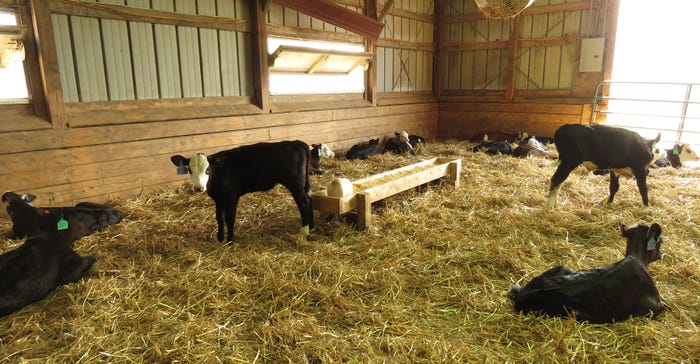June 30, 2022

Dwaine Junck, owner and operator of Junck Dairy in Carroll, Neb., was stuck at a crossroads. He had to decide what direction he wanted his operation to head over the next 20 years.
On one hand, he could completely update his dairy and spend millions of dollars, or he could make the transition to raising beef cattle.
When he took a step back and thought about the reason why he gets up and goes to work on the farm every day, he realized that he simply had a love for farming. In conjunction with his love for cattle, with his ultimate decision to switch to beef, he would be able to give his children an opportunity to come back to the farm.
History lesson
Junck has been dairying for 28 years and is a fourth-generation dairy farmer. As far as they can go back in their genealogy, the Juncks have always been farmers. In addition to carrying on the family legacy, Junck has served on numerous boards and committees within the industry — including the Midwest Dairy corporate board; the American Dairy Coalition as Nebraska chairman; and the Farm Bureau as county president, along with other positions.
Initially, this switch to beef was made because it was hard to keep good employees, and the operation had grown to the point where they were operating 24 hours a day and milking 600 cows, three times a day.
“I won’t ask someone to do something that I wouldn’t do,” Junck says. He knew that his facilities needed to be upgraded to handle that many cattle. However, the cost of upgrades was just too much. Along with always being short on employees, his children don’t have a love for all the work that the dairy is, so transitioning to beef was the best decision for his farm and his family.
Dairy to beef
Junck is no stranger to the beef cattle industry. Before making the switch, his parents had some beef cattle in their operation. He had also helped neighbors who had beef cattle. Four years ago, he started to breed some dairy cows to beef, and now he has quit producing dairy calves.
There have been early challenges. For instance, now that the beef cattle are nursing the cow, it is harder to identify when they are sick. Since the dairy calves are separated from their mother earlier than beef cattle, it was easier to notice which ones needed assistance.
Another realization is that the mother may not produce enough milk to provide for the calf, which was never a problem when Junck was dairying. Altering the feeding programs has also had a learning curve. There is a challenge of making sure that you are not overconditioning the cattle because the nutritional requirements are different.
As for what has been easier than expected, Junck says that the calves are strong when they hit the ground, and after calving, the cows calm down. He also is amazed at how much less labor beef cattle take. “I have 300 beef cattle and 200 dairy cattle, and I do the majority of the work with the dairy cattle,” he says.
Making it work
Economically, the input costs have decreased dramatically for the operation. “I buy one pallet of mineral a month for the beef, where for the dairy I would buy six truckloads of commercial feed a month,” Junck notes.
Utilities, labor and repair costs all have decreased during this transition. Junck is hesitant to completely get rid of all the dairy cows because once he does, he will not get his milk check twice a month. With the switch, he will have to manage his cash flow differently, so while making this adjustment, he plans to milk cows into next year.
He has repurposed dairy equipment to meet the needs of the beef operation by changing his freestall barns into a bed-packed barn for calving. He will change his milking parlor into a cattle-working facility once he is done milking cows.
The beef cattle are inhabiting the place where all his replacement heifers were. For feeding and manure management, it all transitions nicely to meet the needs of the beef. He also has a robotic calf feeder that will still prove to be handy when feeding beef cattle.
“The dairy industry is really good at reproduction management and record keeping,” Junck says. This will prove to be a helpful skill in the beef industry as well. Right now, all his beef cattle are on a total mixed ration diet, and he keeps a close eye on nutrition. His experience in cover crops will also prove to be helpful as he can graze cattle on cover crops such as rye.
Looking forward
As Junck reflects on how this process has been so far, he advises those thinking about doing the same thing to look for opportunities to buy cattle when the market prices are low, and then purchase them at a reasonable price.
He would also advise new beef producers not to bite off more than they can chew at once, as he speaks from experience when he bought beef cattle when he was still milking at full capacity. Junck Dairy is excited for the future and looking forward to carrying on the family legacy in agriculture, just with a different type of livestock.
Hodges writes from Julian, Neb.
You May Also Like




